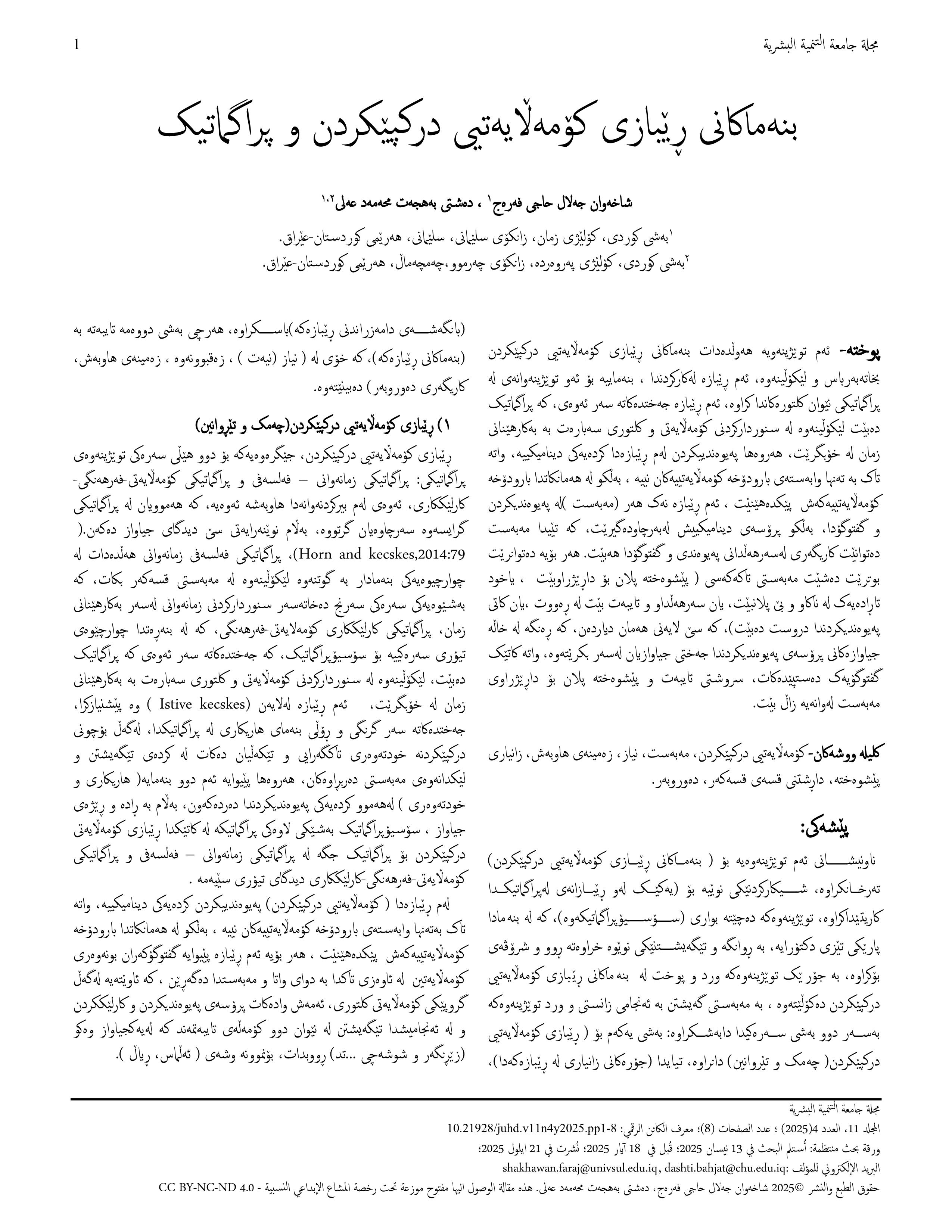The Basis of Social Cognitive Theory w pragmatics
DOI:
https://doi.org/10.21928/juhd.v11n4y2025.pp1-8Keywords:
Social Cognitive, Purposes, intention, Common ground, Prior knowledge, Structuring the speaker's speech, contextAbstract
The current study attempts to discuss the concepts and basis of social cognitive approach. This approach is widely used while studying, comparing and contrasting the pragmatics of different cultures. This approach emphasizes that pragmatics has to include limiting the social and cultural aspects while studying a language. Moreover, communication, in this approach, is a dynamic action; which means that an individual is not only in contact with the social situations; rather he/she makes up the social situation. This approach not only considers purpose in communication and conversation, but also considers dynamic process in which purpose can affect the emergence of communication and conversation. Hence, it can be stated that an individual’s purpose can be pre-planned, or somehow unexpected/unplanned or be the result or emergent upon the situation which are three dimensions of the same phenomenon. These dimensions might be emphasized differently while the different points of communication process are tackled. This means that when a conversation starts, special nature and pre-planned purpose might be dominant.
References
Istvan Kecskes, Sociocognitive Pragmatics, Comp. by: Karthikeyan Stage: Proof Chapter No.: 28 Title Name: HaughetalDate:1/12/2020-2008-2014, Time:09:10:32 Page Number: 592.
Clark, H. H. (2009). Context and common ground. In J. L. Mey, ed, ConciseEncyclopedia of Pragmatics. Oxford: Elsevier, pp. 116–19.
Clark, H. H., Schreuder, R. and Buttrick, S. (1983). Common ground and theunderstanding of demonstrative reference. Journal of Verbal Learning andVerbal Behavior, 22, 245–58.
Finkelstein, S., Hambrick, D. C. and Cannella, B. (2008). Strategic Leadership:Theory and Research on Executives, Top Management Teams, and Boards.Oxford: Oxford University Press.
-García-Gómez, A. (2020). Intercultural and interpersonal communicationfailures: Analyzing hostile interactions among British and Spanish university students on WhatsApp. Intercultural Pragmatics, 17(1), 27–53.
-Gumperz, J. (1982). Discourse Strategies. Cambridge: Cambridge UniversityPress.
-Horton, W. S. and Keysar, B. (1996). When do speakers take into accountcommon ground? Cognition, 59, 91–117.
-Horn, L. and Kecskes. I. (2013). Pragmatics, discourse and cognition. In
A. Stephen, R. J. Moeschler and F. Reboul, eds., The Language-Cognition Interface. Geneva: Librairie Droz, pp. 353–75.
-Keysar, B., Barr, D. and Horton, W. (1998). The egocentric basis of languageuse: Insights from a processing approach. Current Directions in PsychologicalScience, 7(2), 46–50.
-Keysar, B. and Henly, A. (2002). Speakers’ overestimation of their effectiveoness. Psychological Science, 13, 207–12.
-Kecskes, I. (2008). Dueling contexts: A dynamic model of meaning. Journal of Pragmatics, 40(3), 385–406.
-Kecskes, I. (2014). Intercultural Pragmatics. Oxford: Oxford University Press.
-Kecskes, I. (2019). Impoverished pragmatics? The semantics-pragmatics interface from an intercultural perspective. Intercultural Pragmatics, 16(5), 489–517.
- Karthikeyan Stage: Proof Chapter No.: 28 Title Name: Haughetal Date:1/12/20 Time:09:10:32 Page Number: 595.
-Liu, P. and You, X. Y. (2019). Metapragmatic comments in web-based intercultural peer evaluation. Intercultural Pragmatics, 16(1), 57–85.
-Leech, G. (1983). Principles of Pragmatics. London and New York. Longman.
-Levinson, S. C. (2003). Language and mind: Let’s get the issues straight! InG. Dedre and S. Goldin-Meadow, eds., Language in Mind: Advances in theStudy of Language and Cognition. Cambridge, MA: MIT Press, pp. 25–46.
-Mildorf, J. (2013). Reading fictional dialogue: Reflections on a cognitivepragmatic reception theory. Anglistik: International Journal of English Studies, 24(2), 105–16.
-Macagno, F. and Capone, A. (2017). Presuppositions as cancellable inferences. In K. Allan, A. Capone and I. Kecskes, eds., Pragmemes and Theories ofLanguage Use. Cham, Switzerland: Spinger, pp. 45–68.
-Macagno, F. (2018). A dialectical approach to presuppositions. Intercultural Pragmatics, 15(2), 291–313.
-Sperber, D. and Wilson, D. (2004). Relevance: Communication and Cognition.2nd ed. London: Blackwell
-Stalnaker, R. C. (2002). Common ground. Linguistics and Philosophy, 25,701–
-Samovar, L. A., Porter, R. E., & Jain, N. C. (1981). Understanding intercultural communication. Belmont, CA: Wadsworth Publishing Company.

Downloads
Published
How to Cite
Issue
Section
License
Copyright (c) 2025 Shakhawan Jalal Faraj, Dashti Bahjat Muhammed Ali

This work is licensed under a Creative Commons Attribution-NonCommercial-NoDerivatives 4.0 International License.


